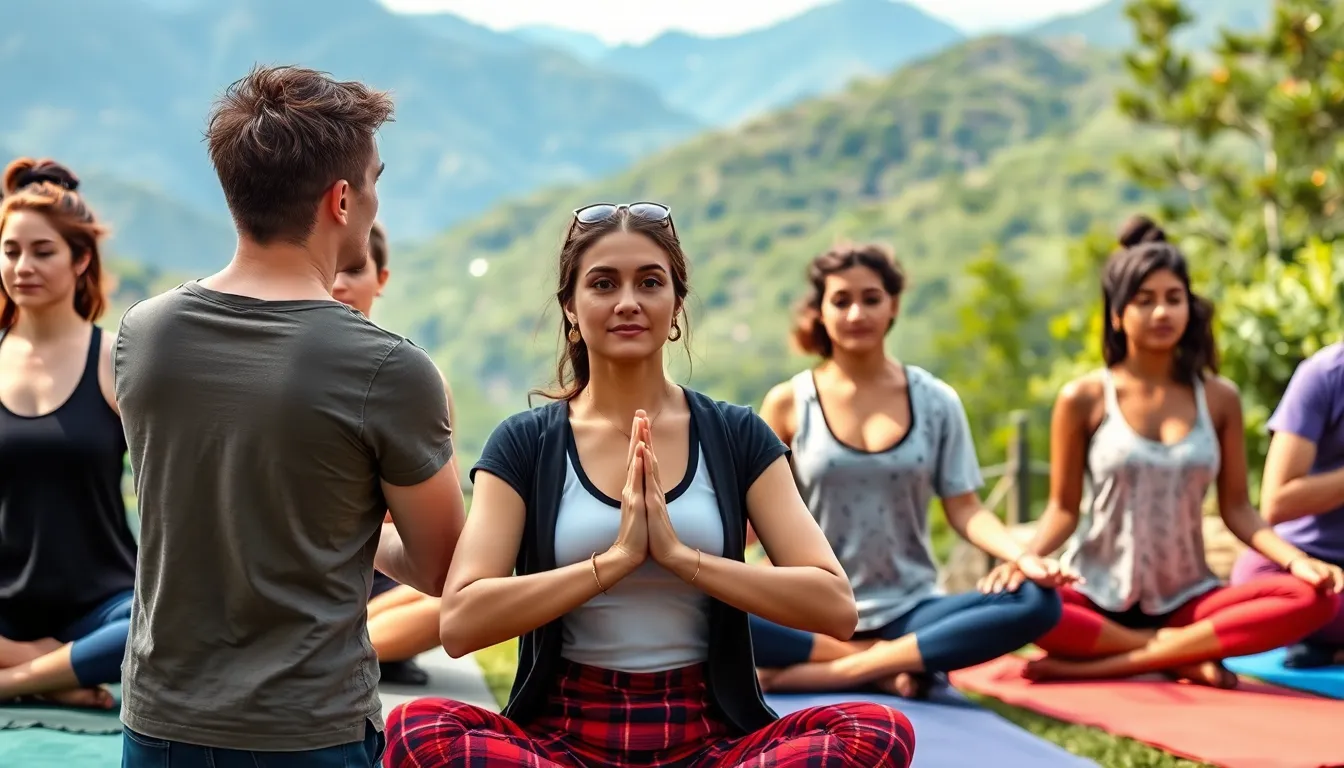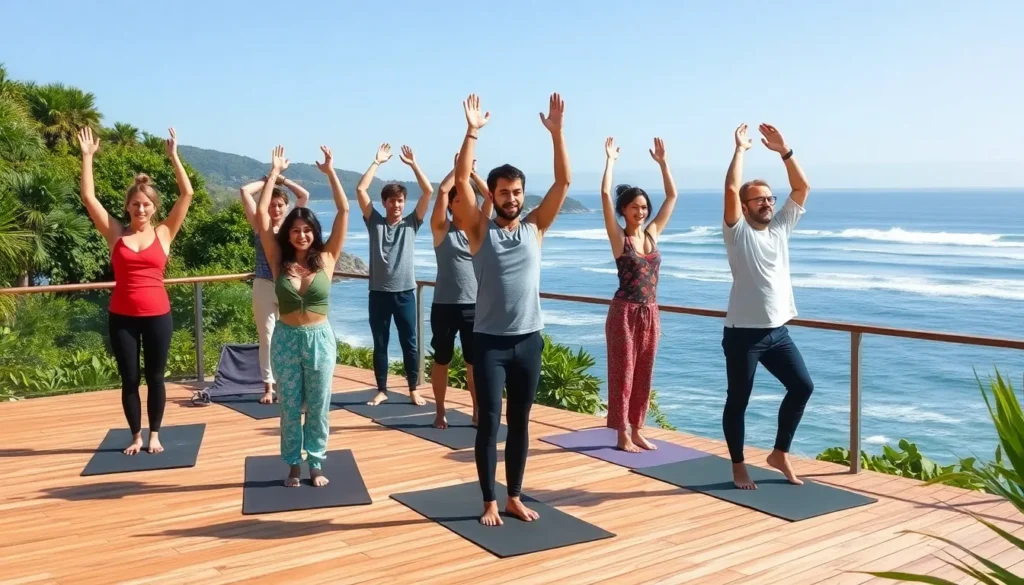In a world where hustle culture reigns supreme, young adults often find themselves juggling careers, social lives, and endless to-do lists. Enter wellness retreats—those magical getaways where stress takes a backseat and relaxation steals the spotlight. Picture this: a serene landscape, yoga at sunrise, and the sweet sound of silence as they finally ditch their phones. Sounds tempting, right?
Table of Contents
ToggleOverview Of Young Adults Wellness Retreats
Young adults seek wellness retreats to escape the pressures of modern life. These retreats focus on relaxation, personal growth, and rejuvenation. Activities typically include yoga sessions, mindfulness practices, and holistic workshops. Attendees often participate in guided meditation to enhance mental clarity and reduce stress.
Wellness retreats vary in duration, from weekend getaways to week-long programs. Locations range from remote mountains to coastal areas, providing diverse environments for relaxation. Natural settings contribute to a peaceful atmosphere, allowing participants to reconnect with themselves.
Digital detoxing is a core component. Young adults benefit from disconnecting from technology, leading to improved focus and reduced anxiety. Engaging in group activities fosters community and support, creating lasting connections among participants.
Nutrition plays a vital role at these retreats. Healthy meal options, often organic and locally sourced, promote well-being. Participants learn about balanced diets, empowering them to make healthier choices post-retreat.
Feedback consistently highlights positive transformations. Many attendees report increased awareness, motivation, and overall well-being. Wellness retreats serve as valuable opportunities for young adults to invest in their mental and physical health.
Benefits Of Wellness Retreats

Wellness retreats offer numerous advantages, particularly for young adults seeking balance and rejuvenation. These retreats provide essential services for enhancing overall well-being.
Mental Health Improvements
Participants often experience significant mental health improvements during wellness retreats. Activities like mindfulness practices and guided meditation cultivate emotional awareness and clarity. Stress reduction techniques commonly employed lead to a decrease in anxiety levels. Engaging in group discussions fosters connection and support, creating a sense of belonging. Many find their motivation boosted after sharing experiences and challenges with others. Feedback consistently shows improved focus and emotional resilience post-retreat, making wellness retreats vital for mental health enhancement.
Physical Health Benefits
Wellness retreats contribute to notable physical health benefits. Attendees enjoy nutritious, often organic meals designed to enhance their overall dietary choices. Activities such as yoga and hiking promote physical fitness while reducing tension in the body. Participants frequently report increased energy levels after engaging in these activities. Refreshing surroundings in serene locations also play a role in promoting restful sleep patterns. Reduced stress and improved nutrition help enhance the immune system, supporting long-term physical health.
Types Of Wellness Retreats
Wellness retreats come in various forms, each offering unique experiences tailored to specific interests and needs.
Yoga Retreats
Yoga retreats focus on physical and mental well-being through yoga practices. These retreats cater to various skill levels, from beginners to advanced practitioners. Daily yoga classes typically include different styles such as Hatha, Vinyasa, or Yin yoga, promoting flexibility and strength. Participants often enjoy guided meditation sessions that enhance mindfulness and overall relaxation. Additionally, these retreats foster community through group activities, allowing attendees to connect with like-minded individuals. Healthy meals prepared with fresh, organic ingredients support both physical health and energy levels throughout the retreat.
Nature Retreats
Nature retreats immerse attendees in serene natural environments, significantly reducing stress levels. Those who participate often engage in outdoor activities such as hiking, kayaking, or nature walks. Such experiences promote physical fitness while connecting individuals with the natural world, enhancing overall wellness. Breathing in fresh air and enjoying tranquil scenery improve mood and mental clarity. Workshops held at these retreats frequently include topics like sustainability, environmental awareness, and holistic living. The healing properties of nature play a crucial role in fostering revitalization and personal growth for all participants.
Mindfulness Retreats
Mindfulness retreats emphasize awareness and presence in the moment, offering various practices aimed at enhancing emotional health. Guided meditation sessions serve as central activities, helping individuals cultivate mindfulness and reduce anxiety. Experts often lead workshops that explore topics such as stress management, emotional resilience, and self-compassion. Practical techniques like journaling and mindful walking are frequently incorporated, providing tools for daily life. Participants reap benefits such as increased self-awareness and improved focus, contributing to lasting mental well-being. Community-building activities create a supportive environment where individuals can share experiences and insights.
Choosing The Right Retreat
Selecting the ideal wellness retreat requires careful thought. Participants must consider various aspects to ensure the retreat aligns with their needs.
Location Considerations
Location significantly influences the retreat experience. Remote mountains and tranquil coastal areas create peaceful settings that enhance relaxation. Natural surroundings stimulate mindfulness and facilitate meaningful encounters with nature. Accessibility also plays a role; proximity to major transportation hubs can simplify travel. Additionally, evaluating the climate is essential, as different environments offer unique benefits during various seasons.
Budgeting For Your Retreat
Budgeting ensures participants make informed decisions without compromising on quality. Costs vary depending on accommodation types, activities included, and duration. Researching early often reveals budget-friendly options without sacrificing the retreat’s essence. Many retreats offer tiered pricing, allowing flexibility to suit different budgets. Participants should also factor in travel expenses and any additional costs for workshops or excursions. Setting a clear budget promotes a stress-free planning process, ultimately leading to a rewarding experience.
Wellness retreats offer young adults a much-needed sanctuary from the pressures of modern life. These experiences not only promote relaxation but also foster personal growth and community connections. By stepping away from technology and immersing themselves in serene environments, participants can rejuvenate their minds and bodies.
The focus on nutrition and holistic practices equips attendees with valuable tools for maintaining their well-being long after the retreat ends. As young adults seek balance and clarity in an increasingly demanding world, wellness retreats stand out as transformative opportunities for self-discovery and renewal. Investing in these experiences can lead to profound changes that enhance overall quality of life.



